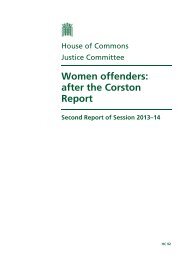REFERENCESAPPENDIX I1 Street, C., Stapelkamp, C., Taylor, E.,Malek, M. <strong>and</strong> Kurtz, Z. (2005).<strong>Minority</strong> Voices: research <strong>into</strong> <strong>the</strong> <strong>access</strong><strong>and</strong> <strong>acceptability</strong> <strong>of</strong> services for <strong>the</strong>mental health <strong>of</strong> young people fromBlack <strong>and</strong> minority ethnic groups.London: YoungMinds.2 Maxwell, R. J. (1984). Quality assessmentin health. British Medical Journal, 288,pp. 1470-1472.3 Department for Education <strong>and</strong> Skills <strong>and</strong>Department <strong>of</strong> Health. (2004). NationalService Framework for children, youngpeople <strong>and</strong> maternity services: st<strong>and</strong>ard 9<strong>the</strong> mental health <strong>and</strong> psychologicalwell-being <strong>of</strong> children <strong>and</strong> young people.London: Department <strong>of</strong> Health. Fromhttp://www.dh.gov.uk/assetRoot/04/09/05/60/04090560.pdf4 Fonagy, P., Target, M., Cottrell, D., et al.(2002). What works for whom? A criticalreview <strong>of</strong> treatments for children <strong>and</strong>adolescents. London: The Guilford Press.5 Kurtz, Z. & James, C. What's new:learning from <strong>the</strong> CAMHS InnovationProjects. London: Department forEducation <strong>and</strong> Skills. In press.6 Department <strong>of</strong> Health. (2003).Delivering Race Equality: a framework foraction. Mental health services:consultation document. London:Department <strong>of</strong> Health. Fromhttp://www.dh.gov.uk/assetRoot/04/06/94/27/04069427.pdf7 Department <strong>of</strong> Health. (1999).Saving lives: Our Healthier Nation.London: Stationery Office. Fromhttp://www.ohn.gov.uk/ohn/ohn.htmFrom Kurtz <strong>and</strong> James (In press) What’s New:learning from <strong>the</strong> CAMHS Innovation Projects. 5Key elements in a servicethat ‘works’For children <strong>and</strong> young people,<strong>the</strong> service should: Be readily <strong>access</strong>ible, for example by <strong>of</strong>feringappointments at times that can be negotiatedto suit <strong>the</strong> service user, as well as home visiting<strong>and</strong> outreach. Be acceptable, <strong>of</strong>fering a non-stigmatisingenvironment <strong>and</strong> a welcoming, respectful <strong>and</strong>empowering approach. Fully recognise <strong>the</strong> problems <strong>of</strong> <strong>the</strong>child/young person <strong>and</strong> sensitively undertakecareful st<strong>and</strong>ardised assessment <strong>of</strong> <strong>the</strong>ir needs. Have <strong>the</strong> capability <strong>and</strong> underst<strong>and</strong>ing towork with <strong>the</strong> context in which <strong>the</strong> youngperson lives, eg. minority ethnic communities. Seek to engage children, young people <strong>and</strong><strong>the</strong>ir parents/carers. Address <strong>the</strong> possible need to change <strong>the</strong>attitudes <strong>of</strong> young people <strong>and</strong> <strong>the</strong>irparents/carers <strong>and</strong> those <strong>of</strong> staff workingin <strong>the</strong> service. Offer a range <strong>of</strong> interventions tailoredto suit individual needs, to include practicalsupport, as well as individual <strong>and</strong> o<strong>the</strong>rtypes <strong>of</strong> <strong>the</strong>rapy. Offer advice, consultation <strong>and</strong> training too<strong>the</strong>rs working with children <strong>and</strong> families. Work in close collaboration with <strong>the</strong>relevant o<strong>the</strong>r disciplines <strong>and</strong> agencies. Have <strong>the</strong> capacity to keep in touch withyoung people over <strong>the</strong> long term, if necessary,<strong>and</strong> to <strong>of</strong>fer fur<strong>the</strong>r short-term interventions<strong>and</strong>/or arrange for o<strong>the</strong>r appropriatesupport services.For pr<strong>of</strong>essionals, managers<strong>and</strong> commissioners, <strong>the</strong> serviceshould have: Clear <strong>and</strong> achievable aims, objectives <strong>and</strong>vision shared by all agencies <strong>and</strong> <strong>the</strong> staff team. Effective <strong>and</strong> consistent leadership endorsedby all agencies. Strong inter-agency commitment, over <strong>the</strong>medium to long term, including a steering orstrategy group able <strong>and</strong> willing to tackle difficultissues. Commitment to consulting with, <strong>and</strong> actingon, <strong>the</strong> views <strong>of</strong> young people <strong>and</strong> <strong>the</strong>ir families. Links with existing services within <strong>the</strong>local CAMH service system, as an integral part<strong>of</strong> <strong>the</strong> tiered framework <strong>and</strong> <strong>the</strong> CAMHSdevelopment strategy. Links with services <strong>and</strong> initiatives not directlywithin <strong>the</strong> CAMH service system, such aseducation, <strong>the</strong> voluntary sector <strong>and</strong> local SureStart programmes. An ability to attract <strong>and</strong> retain funding. A stable, multidisciplinary staff group, withopportunities for training <strong>and</strong> development. Positive commitment to continuedevaluation <strong>and</strong> audit. Balance between providing a direct serviceto its users <strong>and</strong> influencing <strong>the</strong> broader networkon issues <strong>of</strong> young people’s mental health.20
APPENDIX IIAs set out in Delivering Race Equality:A Framework for Action. Mental Health Services(2003), 6 people from Black <strong>and</strong> minority ethniccommunities are more likely to experience: Problems in <strong>access</strong>ing services. Lower satisfaction with services. Cultural <strong>and</strong> language barriers in assessments. Lower GP involvement in care. Inadequate community-based crisis care. Lower involvement <strong>of</strong> service users,family <strong>and</strong> carers. Inadequate support for Blackcommunity initiatives. An aversive pathway <strong>into</strong> mental healthservices:- higher compulsory admission ratesto hospital;- higher involvement in legal system <strong>and</strong>forensic settings;- higher rates <strong>of</strong> transfer to medium <strong>and</strong> highsecure facilities. Higher voluntary admission rates to hospital. Lower satisfaction with hospital care. Lower effectiveness <strong>of</strong> hospital treatment. Longer stays in hospital. Less likelihood <strong>of</strong> having socialcare/psychological needs addressed withincare planning/treatment processes. More severe <strong>and</strong> coercive treatments. Lower <strong>access</strong> to talking treatments.Delivering Race Equality also states that<strong>the</strong> Sainsbury Centre for Mental Health hasidentified that: Many people, particularly in <strong>the</strong> Black African<strong>and</strong> Caribbean communities, do not believe thatmainstream mental health services can <strong>of</strong>ferpositive help, so <strong>the</strong>y delay seeking help. They <strong>the</strong>refore are not engaging with servicesat an early point in <strong>the</strong> cycle when <strong>the</strong>y couldreceive less coercive <strong>and</strong> more appropriateservices, coming instead to services in crisis when<strong>the</strong>y face a range <strong>of</strong> risks including over- <strong>and</strong> misdiagnosis,police intervention <strong>and</strong> use <strong>of</strong> <strong>the</strong>Mental Health Act. These aversive care pathways fur<strong>the</strong>rinfluence both <strong>the</strong> nature <strong>and</strong> outcome <strong>of</strong>treatment <strong>and</strong> <strong>the</strong> willingness <strong>of</strong> communities toengage with mainstream services.21
















